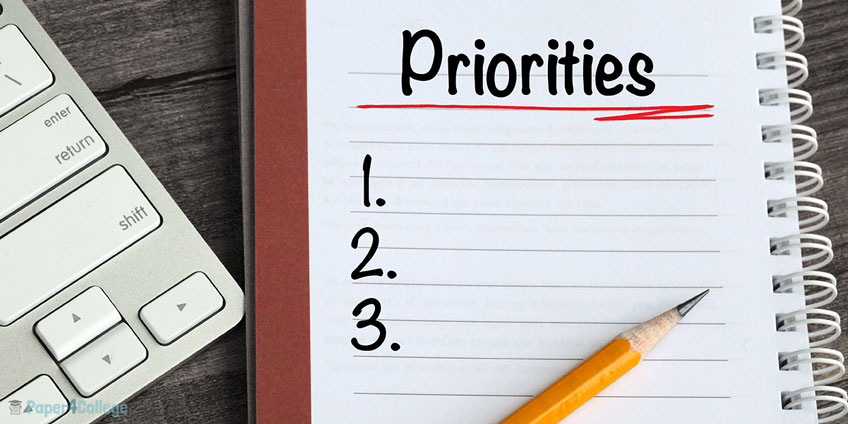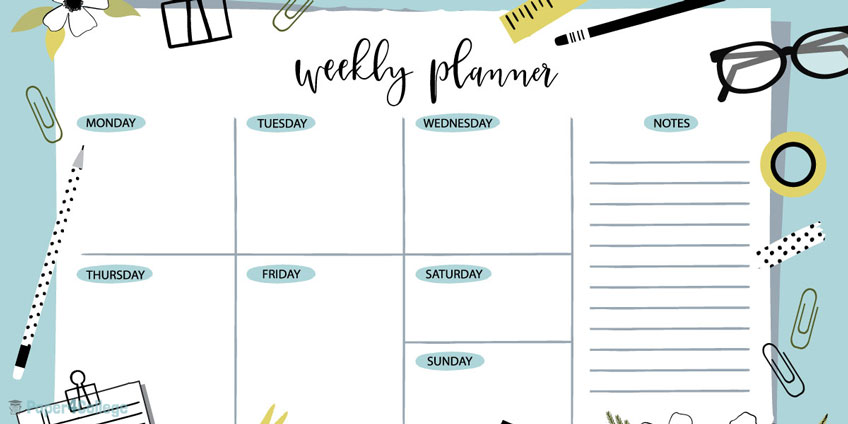Have a Schedule: Be Productive and Happy. Part 1

Many students try to change their study habits and become effective, but they forget about their decision a month later. Sometimes it is difficult to organize your time. In the university, you have to find your work pace on a busy schedule. During the student life, everyone wants to have freedom, spend much time going out and communicating with friends, but school work demands much time too. During the first year of studies, students do not realize that they spend a lot of time doing personal work. Some of them study too much and get discouraged because they do not see the results. They feel stressed and tired because of their failures. We will help you to stop that by following our tips.
First and foremost, if you do not have enough time and energy, always order essays on paper4college.com. This is a proven way to save your time and nerves.
Define Your Priorities
A teacher puts big stones in a vase and asks his or her students whether the vase is full. Everyone nods but the professor immediately puts small pebbles there. "And this time?" After that, the teacher puts sand and water there. The meaning of this story: this full vase is your time. It can allow you to do everything: study, do personal work, rest, go out and achieve your goals. To organize yourself, the first step is to choose your "big stones": there are the elements essential for you, sleep time is important, the meals; then, your goals for this year, your main activities, for example, your classes and your personal work, then sport for some people and time spent on their job, hobbies and anything else for others.
Create a Schedule and Put Big Stones
The first thing you need to put in the vase of your schedule is your priorities. Remember that it is not only about planning time for school and job. To create your perfect schedule, plan the time for your entire week, from Sunday to Monday, from wake-up time to bedtime. This schedule must include not only your classes but also personal work time, extracurricular activities, time for transport, regular hobbies, sport, etc. Find the technique that is convenient for you: a board you can hang on the wall in your room, a cute paper planner, or a Play Store/Apple Store calendar software. We recommend that you try using different colors for personal work, lessons, sport, going out, etc.
Why Should You Create the Schedule?

The schedule gives you the opportunity to find time for everything: if your schedule is quite detailed, you can place "big stones" and small activities that you need to do for pleasure: one-hour workout, reading before going to bed, an evening out on Friday night. With the schedule, you understand your ability to do many things and waste less time.
The plan makes the things automatic: it is less difficult to make an activity regular having it scheduled than one that is not programmed. For homework, it is even more effective; the brain creates "reflexes:" for example, you get used to practicing English every lunch, rereading your classes after dinner, doing research for an essay on Sunday night, and then you have fewer problems with work.
Organize Your Life
The schedule allows you to manage time and frees the head. Unorganized actions are the cause of negative emotions. With a schedule, you know that everything can be done in due time, and this allows you to focus on everything in the certain moment, then think about something else. For example, during one hour, you are intensively concentrating on working in the library (forgetting about your cell phone). Then, you will thoroughly enjoy your time of relaxation while drinking coffee.
Your Personal Rhythms

A good plan should take into account your biological rhythms. Many students do not sleep enough because they want to go out and have some fun in the evening or prepare for exams. Yet lack of sleep would be a source of stress for 20% of students! Take into consideration that it cannot be recovered the next day and that it causes difficulties of concentration and, thus, of memorization.
How much sleep do you need every day to be productive? For adults, it is about from 7 to 9 hours. We also know that sleep before midnight is the most recuperative. Avoid working in front of a screen just before going to bed because it can interfere with falling asleep. You should also consider your type of sleeping: are you a morning person or are you more active at night?
Type of Sleeper

If you are more active after getting up, evening work sessions and late evenings (for example, at Thursday student parties) should be reduced: you will be more effective if you get up earlier and start a study session right after that. In case you are more active at night, do not plan too many tasks because you should sleep enough to get up early and go to classes the next day. If you need to fall asleep quickly, be careful not to go to bed directly after working or using a computer screen. The brightness of the screens slows down the secretion of the sleeping hormone. It is better to have quiet activities to relax before sleep, for example, taking a shower, drinking a cup of herbal tea or reading something that calms you (comics or novels).
Work Step by Step and Change Activities
For personal work on lessons outside classes, you have to define the tasks you want to do in each session: what subject and what kind of work you are going to do? We recommend that you alternate the discipline and style of the exercises: read a textbook, then solve a problem, then translate a text, do a research for an essay, complete an assignment, etc. You will be more productive studying this way because you can memorize, concentrate and understand much better: our concentration abilities are limited. Students cannot study the same topic more than 40 minutes. Change of the topic of study allows you to clear your head and concentrate more effectively on another subject. It helps not to waste your time studying in a less effective way.
